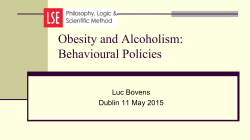
Budget 2015: Alcohol Industry Profits at Expense of our NHS We are
Budget 2015: Alcohol Industry Profits at Expense of our NHS Yesterday the Chancellor announced cuts to alcohol duties, with the price of beer to be cut by 1p on the pint and duties on cider, Scotch whiskey and other spirits to be cut by 2%. Wine duties are to be frozen. This decision is a slap in the face to our doctors, our nurses, our paramedics and our police who are on the front line in paying for this cut. Alcohol related harm costs the NHS £3.7 billion every single year1, and annually we see over one million alcoholrelated hospital attendances.2 To cut tax on cider and spirits at a time when the NHS is at breaking point is a disgrace. Our frontline services can’t afford for alcohol to get any cheaper. The costs of these tax breaks to the Treasury total £920 million.3 This is in addition to the £1.5 billion cost of abolishing the alcohol duty escalator in last year’s budget.4 Reducing the affordability of cheap alcohol was a key component of the Government’s Alcohol Strategy and is recognized by the World Bank, OECD, World Health Organisation and the European Commission as one of the most effective ways of tackling alcohol harm. With alcohol consumption and harm in the UK at historically high levels, it comes as a shock to learn that drinking will be further incentivised by making alcohol cheaper. Costs to the public purse over the next five years from cuts in the last two successive budgets would pay for: The annual salaries of over 12,000 nurses Nearly 10.5 million emergency ambulance call outs More than 10 million hospital bed days Of all alcohol sold, it is the very cheap products such as super strength white cider and spirits that play the biggest part in driving alcohol related harm.5 Even at current levels, a can of Frosty Jack’s white cider can still be sold for 16p under the ban on below cost sales. Another drop in duty will weaken this ban further and result in the high strength products that are consumed by our children and harmful drinkers becoming even cheaper. With current levels of taxation recouping less than half of the £21billion that alcohol harm costs the British economy every year6, it is the taxpayer who is footing the bill. Over three quarters of the public have said no to further tax cuts on alcohol.7 It is time the Government started listening. We are asking MPs to vote against the Chancellor’s proposed cuts to alcohol duty 1 HM Government (2012) The government’s alcohol strategy. 2012 HM Government (2013) Reducing harmful drinking 2013. www.gov.uk/government/policies/reducing-harmful-drinking [Accessed 19 June 2014] HM Government, (2015) Budget 2015 4 HM Government, (2014) Budget 2014 5 Institute of Alcohol Studies (2014) Use of alcohol as a loss-leader. Briefing paper 6 Office for National Statistics. HMRC TAX & NIC receipts 2013/14, December 2014 7 Alcohol Health Alliance (2014) Alcohol Behaviours and Attitudes Survey 2 3 What are we calling for? 1. Reinstate the duty escalator. Alcohol sold in the UK is 61% more affordable than it was in 1980. 8 We know that price drives consumption; duty levels should continue to increase year on year, above inflation and in line with disposable incomes, to counter the trend of increasing affordability that has been associated with rising consumption and harm. 2. Increase duty on high strength cider. Cider and beer are similar products however cider is currently taxed at a much lower rate than beer. The alcohol duty rate (duty + VAT) on a litre of cider 7.5% ABV is 6p per unit of alcohol, compared to 23p per unit of alcohol for a litre of beer of the same strength. We also know that the cheapness relative to alcohol strength makes high strength ciders such as Frosty Jacks popular with dependent and young drinkers. Additional tax bands should be added to the existing structure to allow higher strength ciders to be taxed at higher rates. 3. Ensure spirits are taxed at a higher rate than wine and beer. In comparison to beer and wine, spirits are generally much cheaper to produce and distribute. The same rate of duty for all beverage types would mean that distilled spirits could be sold much more cheaply than wine or beer, which is a public health concern as they are much stronger and carry a greater risk of health and social harm. 4. Lobby for change at EU level to incentivise switching to lower alcohol wine. The structure of UK alcohol taxes is governed by European Directives that mean under current structures, it is not possible to tax wine or cider based on their strength, although changing the structure on cider duty, as outlined under recommendation 2, to allow greater variation in tax levels is possible. This means that currently there is no tax incentive at an EU level for wine and cider manufacturers to produce lower strength products. 5. Implement a minimum unit price for all alcoholic products. Minimum unit pricing is an exquisitely targeted policy that targets the cheaper, stronger drinks such as white cider, known to be consumed by harmful and young drinkers. Minimum unit pricing and the alcohol duty escalator are complimentary policies, and should be implemented together to have the greatest impact on tackling high levels of alcohol related harm in the UK. About the Alcohol Health Alliance The Alcohol Health Alliance (AHA) is a coalition of more than 40 organisations who share an interest in reducing the damage caused to health by alcohol misuse in the UK. Our members include medical bodies, charities and alcohol health campaigners. For further information and/or to set up a meeting with an AHA representative, please contact us: alcohol@rcplondon.ac.uk / 0207 566 9809 8 HSCIC, Statistics on Alcohol, England 2014 Briefing
© Copyright 2025









